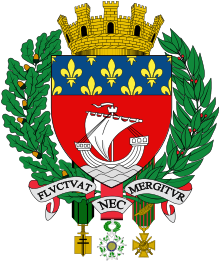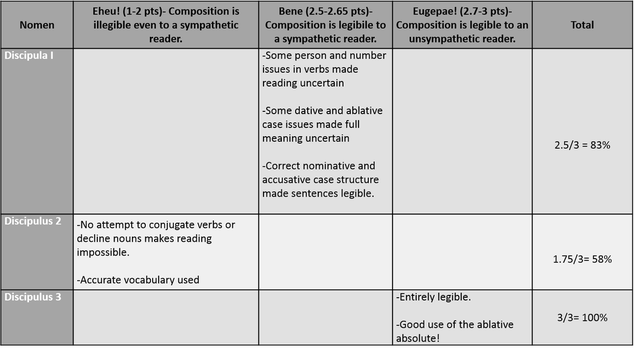Jacquelyn Wilkins
[email protected]
[email protected]
If you teach a world language in today’s environment, there are many buzz-words that you often hear: scaffolding, relevance, engagement, target language, authentic sources, etc. And if you are a Latin teacher, many of the ideas seem not at all to include the needs of your classroom and curricula. I once had to sit through an in-service on how to use menus in the target language to teach food vocabulary. Everyone else could basically put their language’s vocab into the template and were done. You could see the presenter trying to scramble for ideas to include me. She finally asked me if the Romans ever used menus and my mind instantly flew to the picture menus in the Iupanaria in Pompeii. I spared the poor lady the details but did explain that most menus in the ancient world would have been comprised of pictures due to low literacy rates. The presenter stopped making eye contact after a while and I still wonder if she googled “ancient roman picture menus.” I finally created a lesson for students to use food vocabulary in a poem based off Catullus’s dinner invitation poem. It turned out to be a good lesson: students composed the poems, studied and translated recipes, made the dishes and we did our best to replicate a Roman dining experience. So, as Latin teachers, we often have to extend the idea of authentic sources and be very creative in our implementation of criteria that were made more for modern languages.
This leads me to another major buzz-word: relevance. I have found that my students are very aware of and eager to express opinions about current events. I also share this interest and we generally spend some time each class discussing headlines and any connections that we can make to the ancient world. And then the bombing attacks on Beirut and Paris happened. Several of my students also take French, others have been to Paris, some have family in both locations, and I even teach one Syrian refugee, whose family escaped at the beginning of the civil war. As I looked at their faces the Monday after the attacks, I knew that my lesson plans were going to be thrown out the window. They needed to explore these events, the responses of their friends and family, and how they themselves felt. That first day, I completely winged it. I found online news sources that were covering the events and posted them for students to read and created a forum on blackboard for them to post questions about what they read. The news sources were of course in English, so I incorporated Latin in a very artificial manner. In Latin I and II, students found examples of the tenses and cases we were studying and translated those individually (Latin I) or as clauses (Latin II) into Latin. In Latin III-V, students either found examples of complex constructions or combined simple sentences into complex ones using participial, subjunctive, or infinitive phrases in Latin.
The more we read, however, the more questions my students had. Especially as the Islamaphobia reached a boiling point as did nationalistic sentiments in the face of the related refugee crisis. Much of the discourse was toxic and even students who had very conservative leanings were critical of the virulence of some responses, including that of the mayor of our city, Roanoke. He made the unfortunate comment that perhaps we could keep Syrian refugees in camps like the Japanese during World War II. Having our mayor at the center of this firestorm, only increased student’s desire to know more. So, we began to research.
We used Ephemeris as a Latin news source and Nuntii Latini from YLE 1 from Finland. Latin I and II gathered meaning from the texts and radio segments. Latin III-V translated for meaning and responded to prompts in Latin. We examined Roman sources on revolts in Judea and Gaul. We discussed the role of imperialism in creating stability and terrorism. We discovered that Paris and Beirut both had Latin mottos:
From there, the projects became more creative. Some students found Youtube videos made by the families of the victims of the bombing and wrote epitaphs for them in Latin. Some students tweeted about the events using the hashtag: #PaxLutetiaeetBeryto. Some made curse tablets in Latin against those responsible for the attacks. Others made art about the events and wrote descriptions for them in Latin. I graded the compositions for comprehensibility and gave feedback according to this rubric:
The culminating assignment for this impromptu unit was a test over the events of the bombing and the refugee crisis written entirely in Latin. Latin I had a version of the questions that did not use complex constructions and they answered in English. Latin II used the same questions as Latin I, but had to answer them in Latin. Latin III-V had a version of the questions that used the complex constructions that we were studying and they had to answer in Latin in complete sentences. Each question was worth two points for the accuracy of their answer and three points on the above rubric for composition.
The result of this was that because students cared very much about doing well on this project, there were very few grades like Discipulus 2 in the above example. One advanced student wrote a note on the test that said she loved using Latin to express ideas that might be less specific or nuanced if expressed in English. Most of them worked very hard, even going back and asking questions about old material to ascertain the accuracy of their work. As one parent emailed me, “My daughter discusses current events more in her Latin class than in her Government class and is so excited to express herself in a language that I always thought was dead.” Due to the overwhelming response from my students (and parents) and the increase in grammar retention that I’ve seen, I am now working to incorporate current events as the main source of composition in class. I imagine that the connection my students feel between their language expression and their world is similar to the one that Romans felt as they wrote the documents which preserved their language for us to study.




 RSS Feed
RSS Feed